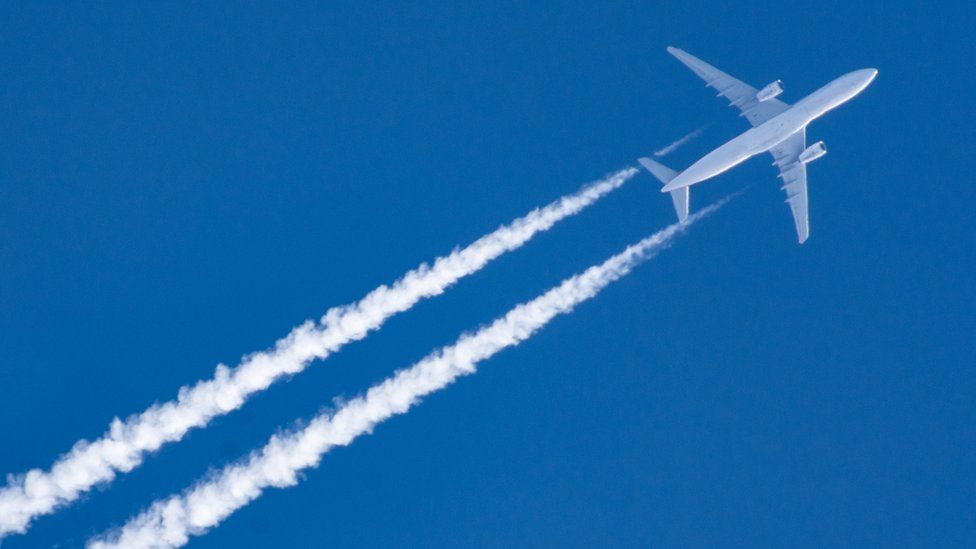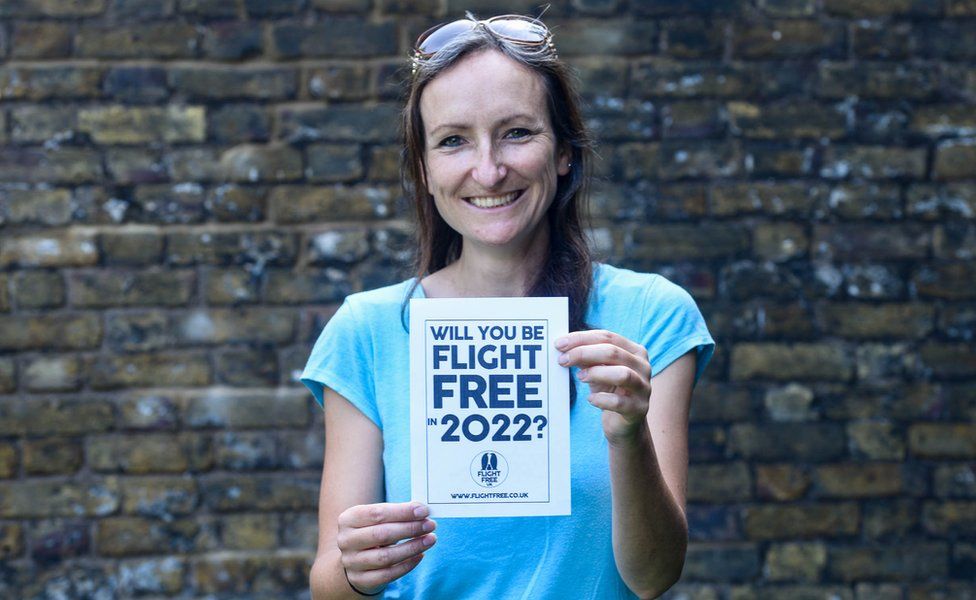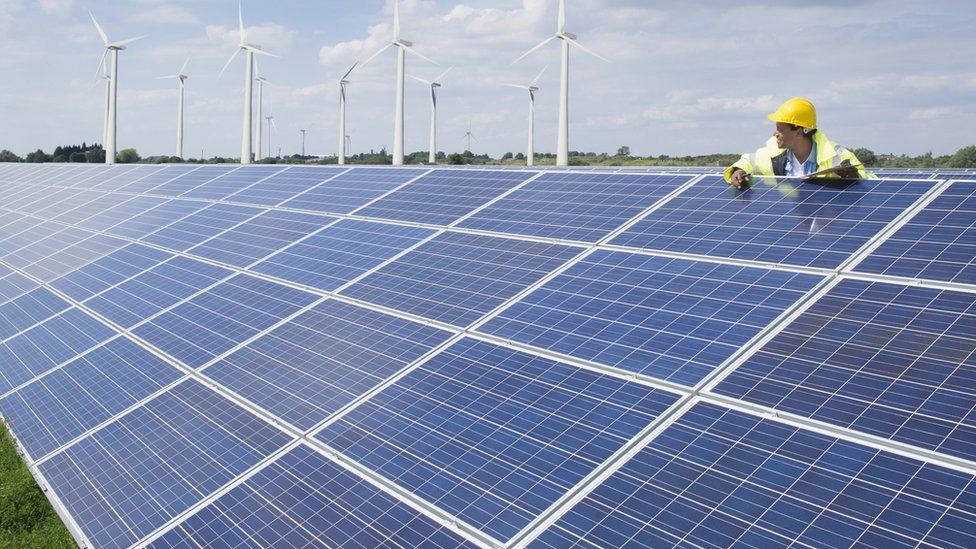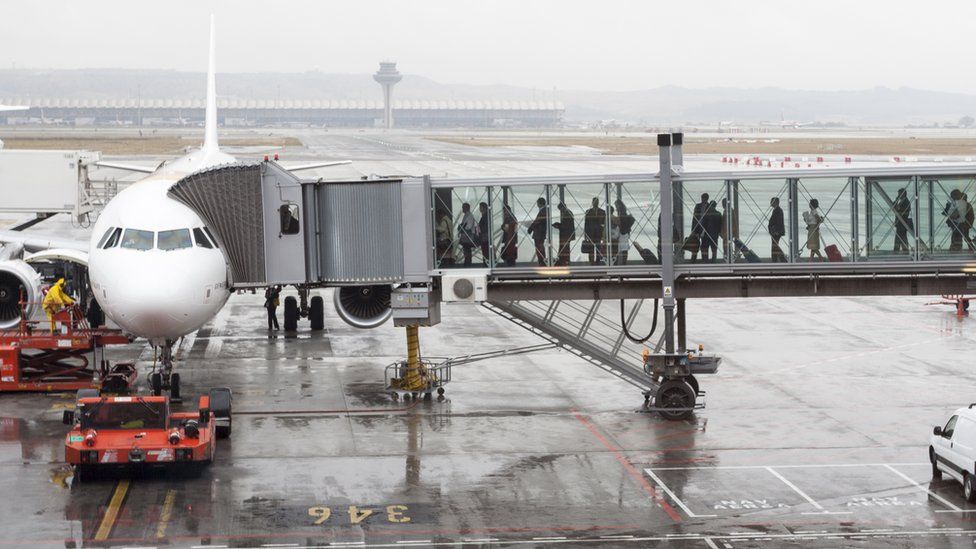Londoner, Valerie Brown is aching to see her daughter and grandchildren in Los Angeles again, but there is a huge barrier - she quit flying on aeroplanes three years ago.
The 69-year-old climate change activist says she made the decision because of the aviation sector's environmental impact.
"I can't fly, unless a machine is developed that takes all the carbon out of the air and reverses the damage, but that's not likely," she says.
"I believe we have to sacrifice a lot to give the young a future on this planet."
As a result of her stand, Ms Brown is reliant upon her daughter and the grandkids visiting the UK. So, before last summer she went three years without seeing them.
Prior to the pandemic, the aviation sector accounted for about 2.4% of global carbon dioxide (CO2) emissions.
But reports say that the environmental impact is much higher when considering the other gases produced by aircraft, and the impact of their condensation trails (contrails).

And a number of studies have attempted to show how much each individual passenger's flight contributes to sea ice melting in the Arctic.
As a result of all this data and concern, a growing number of people, like Ms Brown, are deciding to give up flying all together.
This is despite the airline sector pledging to become carbon neutral by 2050, and all the major airlines having carbon offsetting schemes. Some, such as British Airways, have also already achieved carbon neutrality for certain flights.
"We began offsetting the carbon emissions on all our flights within the UK in January 2020 so our customers fly carbon neutral," says BA's head of sustainability, Carrie Harris.
Anna Hughes stopped flying 12 years ago, also due to her environmental concerns.
She has since only holidayed in the UK and mainland Europe, travelling by train and bike. One trip saw the 29-year-old exploring 1,000 miles of the British coast.

"That was an incredible adventure and showed you don't need to go very far to have an adventure of a lifetime, says Ms Hughes, who lives in London.
She is a founder and director of a campaign called Flight Free UK, which, since 2019, has encouraged people to go without air travel for a year or more. This year almost 4,000 people have committed so far.
"Flying is the most carbon intensive activity you can do as an individual," says Ms Hughes. "People suggest the total carbon emissions are low, but that's because so few people globally have ever been on a plane.
"Signing up to the pledge is about taking action to help solve the climate crisis and acknowledging everything about our lifestyles has to change."
Yet, Ms Hughes adds that she is realistic that some people may need to fly, such as to visit relatives abroad. "I understand everyone's circumstances are different but take a flight diet if you can't completely abstain."
She adds: "If you're taking eight flights a year, reduce it to two. The idea is that it would feed into long-term behavioural change."
But Chris Goater, head of corporate communications at the International Air Transport Association (IATA), says flying is a vital part of global transportation.
"The world is so globalised, just looking at the pandemic you can see how it impacted families [who were apart]. And as an industry we have set out a plan to reduce emissions in line with the Paris Agreement target of [not exceeding] 1.5 degrees global warming."

He adds: "Yes, aviation is around 2.3%, and we obviously want to get that to net zero by 2050. The reason that it's net zero, rather than zero, is that while we might have hydrogen and electric planes flying short-haul routes in some small areas, it's not going to replace all [jet fuel powered] flying by 2050, especially on long-haul routes."
Mr Goater also points to the development of sustainable aviation fuels (SAFs) - biofuels that can be made from maize, algae and waste food oils - as "the key tool" to help the industry reach its net zero ambitions.
"We are asking the government to push incentives for producers of SAFs to produce more, which will bring the cost down closer to jet fuel," he adds. However, SAFs are not used on their own, and are instead blended - at a ratio of up to 50% - with aviation fuel.
However, Peter Kalmus, a climate scientist and author of Being the Change: Live Well and Spark a Climate Revolution, is sceptical of the biofuel's impact.
"You can run planes on processed waste veggie oil, but there isn't nearly enough," he says. "We might get viable long-distance electric planes in the future if battery energy density improves by about a factor of 10, but whether or not we do is irrelevant to the current reality."
Dr Kalmus, who stopped flying back in 2012, is also dubious of carbon offsetting. "Carbon offsets don't reduce the impact of flying," he says. "Once that carbon is burned and in the atmosphere it is burned and in the atmosphere, contributing to the global heating and resultant impacts we're all increasingly experiencing."

However, it is important to stress that climate scientists do not speak with one voice when it comes to the aviation sector.
Piers Forster, a professor of atmospheric physics at the University of Leeds, says that "flying brings huge benefits".
"It's a bad idea to stop flying in a global society," he adds. "We can think much more carefully though, and only make the most necessary trips after considering alternative options such as catching a train or having an online meeting."
But while Prof Foster sees airlines as a continuing necessity, back in London, Ms Brown is resolute about not flying. "Thinking about my young grandchildren [and their future] has spurred me into action."
Latest Stories
-
Transport Consultant proposes nationwide tracking system for motorbikes to curb road indiscipline
22 minutes -
Road Safety Authority seeks legal backing to regulate okada operations amid rising accidents
27 minutes -
Interim Ghana Boxing Authority board meets NSA ahead of extraordinary congress
42 minutes -
Implementation of GH₵1 fuel levy pushes prices of petroleum products up
46 minutes -
NSMQ 2025: Ghana SHS reinstated into North East qualifiers after Sakogu withdrawal
48 minutes -
Interior Minister charges new Fire Service Council to drive legal and operational reforms
58 minutes -
KNUST and the Death of Applied Knowledge: A National Embarrassment in Full View
1 hour -
Bawku conflict: GLOSARGG presents eight-point roadmap to peace
1 hour -
London Mayor Sadiq Khan to address innovation and education at University of Ghana today
2 hours -
Ghana’s housing sector: 90% of houses built by individuals, land access must be improved – ISSER
2 hours -
Fuel prices up: Petrol going for GH₵12.88, diesel GH₵14.88 a litre
2 hours -
Witchcraft accusation turns deadly: 4 arrested over killing of 70-year-old in Sangbana
2 hours -
Teenager reports family to DOVVSU over limited meals, pocket money
2 hours -
Bond market: Trading activity GH¢2.12bn, highest since 2023
2 hours -
Importers and Exporters Association applauds appointment of women to GMA board
2 hours

